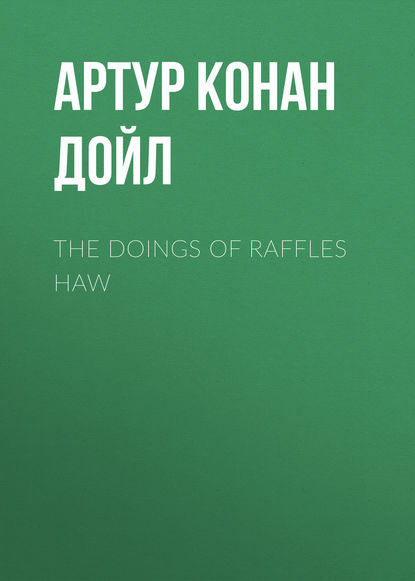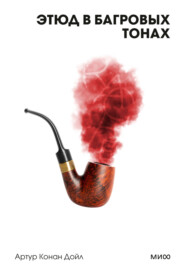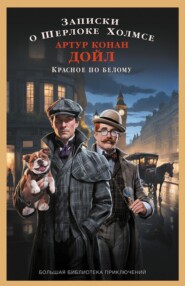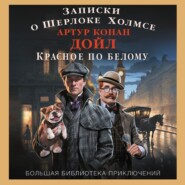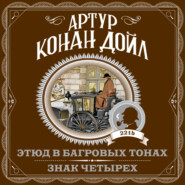По всем вопросам обращайтесь на: info@litportal.ru
(©) 2003-2025.
✖
The Doings of Raffles Haw
Настройки чтения
Размер шрифта
Высота строк
Поля
“That must be avoided at any cost.”
“Oh, I cannot bear even to think of it. Poor Hector! And yet what could I do, Robert? You know that it was only a boy and girl affair. And how could I refuse such an offer as this? It was a duty to my family, was it not?”
“You were placed in a difficult position – very difficult,” her brother answered. “But all will be right, and I have no doubt Hector will see it as you do. But does Mr. Spurling know of your engagement?”
“Not a word. He was here yesterday, and talked of Hector, but indeed I did not know how to tell him. We are to be married by special licence in Birmingham, so really there is no reason why he should know. But now I must hurry or I shall miss my train.”
When his sister was gone Robert went up to his studio, and having ground some colours upon his palette he stood for some time, brush and mahlstick in hand, in front of his big bare canvas. But how profitless all his work seemed to him now! What object had he in doing it? Was it to earn money? Money could be had for the asking, or, for that matter, without the asking. Or was it to produce a thing of beauty? But he had artistic faults. Raffles Haw had said so, and he knew that he was right. After all his pains the thing might not please; and with money he could at all times buy pictures which would please, and which would be things of beauty. What, then, was the object of his working? He could see none. He threw down his brush, and, lighting his pipe, he strolled downstairs once more.
His father was standing in front of the fire, and in no very good humour, as his red face and puckered eyes sufficed to show.
“Well, Robert,” he began, “I suppose that, as usual, you have spent your morning plotting against your father?”
“What do you mean, father?”
“I mean what I say. What is it but plotting when three folk – you and she and this Raffles Haw – whisper and arrange and have meetings without a word to me about it? What do I know of your plans?”
“I cannot tell you secrets which are not my own, father.”
“But I’ll have a voice in the matter, for all that. Secrets or no secrets, you will find that Laura has a father, and that he is not a man to be set aside. I may have had my ups and downs in trade, but I have not quite fallen so low that I am nothing in my own family. What am I to get out of this precious marriage?”
“What should you get? Surely Laura’s happiness and welfare are enough for you?”
“If this man were really fond of Laura he would show proper consideration for Laura’s father. It was only yesterday that I asked him for a loan-condescended actually to ask for it – I, who have been within an ace of being Mayor of Birmingham! And he refused me point blank.”
“Oh, father! How could you expose yourself to such humiliation?”
“Refused me point blank!” cried the old man excitedly. “It was against his principles, if you please. But I’ll be even with him – you see if I am not. I know one or two things about him. What is it they call him at the Three Pigeons? A ‘smasher’ – that’s the word-a coiner of false money. Why else should he have this metal sent him, and that great smoky chimney of his going all day?”
“Why can you not leave him alone, father?” expostulated Robert. “You seem to think of nothing but his money. If he had not a penny he would still be a very kind-hearted, pleasant gentleman.”
Old McIntyre burst into a hoarse laugh.
“I like to hear you preach,” said he. “Without a penny, indeed! Do you think that you would dance attendance upon him if he were a poor man? Do you think that Laura would ever have looked twice at him? You know as well as I do that she is marrying him only for his money.”
Robert gave a cry of dismay. There was the alchemist standing in the doorway, pale and silent, looking from one to the other of them with his searching eyes.
“I must apologise,” he said coldly. “I did not mean to listen to your words. I could not help it. But I have heard them. As to you, Mr. McIntyre, I believe that you speak from your own bad heart. I will not let myself be moved by your words. In Robert I have a true friend. Laura also loves me for my own sake. You cannot shake my faith in them. But with you, Mr. McIntyre, I have nothing in common; and it is as well, perhaps, that we should both recognise the fact.”
He bowed, and was gone ere either of the McIntyres could say a word.
“You see!” said Robert at last. “You have done now what you cannot undo!”
“I will be even with him!” cried the old man furiously, shaking his fist through the window at the dark slow-pacing figure. “You just wait, Robert, and see if your old dad is a man to be played with.”
CHAPTER XIII. A MIDNIGHT VENTURE
Not a word was said to Laura when she returned as to the scene which had occurred in her absence. She was in the gayest of spirits, and prattled merrily about her purchases and her arrangements, wondering from time to time when Raffles Haw would come. As night fell, however, without any word from him, she became uneasy.
“What can be the matter that he does not come?” she said. “It is the first day since our engagement that I have not seen him.”
Robert looked out through the window.
“It is a gusty night, and raining hard,” he remarked. “I do not at all expect him.”
“Poor Hector used to come, rain, snow, or fine. But, then, of course, he was a sailor. It was nothing to him. I hope that Raffles is not ill.”
“He was quite well when I saw him this morning,” answered her brother, and they relapsed into silence, while the rain pattered against the windows, and the wind screamed amid the branches of the elms outside.
Old McIntyre had sat in the corner most of the day biting his nails and glowering into the fire, with a brooding, malignant expression upon his wrinkled features. Contrary to his usual habits, he did not go to the village inn, but shuffled off early to bed without a word to his children. Laura and Robert remained chatting for some time by the fire, she talking of the thousand and one wonderful things which were to be done when she was mistress of the New Hall. There was less philanthropy in her talk when her future husband was absent, and Robert could not but remark that her carriages, her dresses, her receptions, and her travels in distant countries were the topics into which she threw all the enthusiasm which he had formerly heard her bestow upon refuge homes and labour organisations.
“I think that greys are the nicest horses,” she said. “Bays are nice too, but greys are more showy. We could manage with a brougham and a landau, and perhaps a high dog-cart for Raffles. He has the coach-house full at present, but he never uses them, and I am sure that those fifty horses would all die for want of exercise, or get livers like Strasburg geese, if they waited for him to ride or drive them.”
“I suppose that you will still live here?” said her brother.
“We must have a house in London as well, and run up for the season. I don’t, of course, like to make suggestions now, but it will be different afterwards. I am sure that Raffles will do it if I ask him. It is all very well for him to say that he does not want any thanks or honours, but I should like to know what is the use of being a public benefactor if you are to have no return for it. I am sure that if he does only half what he talks of doing, they will make him a peer – Lord Tamfield, perhaps – and then, of course, I shall be my Lady Tamfield, and what would you think of that, Bob?” She dropped him a stately curtsey, and tossed her head in the air, as one who was born to wear a coronet.
“Father must be pensioned off,” she remarked presently. “He shall have so much a year on condition that he keeps away. As to you, Bob, I don’t know what we shall do for you. We shall make you President of the Royal Academy if money can do it.”
It was late before they ceased building their air-castles and retired to their rooms. But Robert’s brain was excited, and he could not sleep. The events of the day had been enough to shake a stronger man. There had been the revelation of the morning, the strange sights which he had witnessed in the laboratory, and the immense secret which had been confided to his keeping. Then there had been his conversation with his father in the afternoon, their disagreement, and the sudden intrusion of Raffles Haw. Finally the talk with his sister had excited his imagination, and driven sleep from his eyelids. In vain he turned and twisted in his bed, or paced the floor of his chamber. He was not only awake, but abnormally awake, with every nerve highly strung, and every sense at the keenest. What was he to do to gain a little sleep? It flashed across him that there was brandy in the decanter downstairs, and that a glass might act as a sedative.
He had opened the door of his room, when suddenly his ear caught the sound of slow and stealthy footsteps upon the stairs. His own lamp was unlit, but a dim glimmer came from a moving taper, and a long black shadow travelled down the wall. He stood motionless, listening intently. The steps were in the hall now, and he heard a gentle creaking as the key was cautiously turned in the door. The next instant there came a gust of cold air, the taper was extinguished, and a sharp snap announced that the door had been closed from without.
Robert stood astonished. Who could this night wanderer be? It must be his father. But what errand could take him out at three in the morning? And such a morning, too! With every blast of the wind the rain beat up against his chamber-window as though it would drive it in. The glass rattled in the frames, and the tree outside creaked and groaned as its great branches were tossed about by the gale. What could draw any man forth upon such a night?
Hurriedly Robert struck a match and lit his lamp. His father’s room was opposite his own, and the door was ajar. He pushed it open and looked about him. It was empty. The bed had not even been lain upon. The single chair stood by the window, and there the old man must have sat since he left them. There was no book, no paper, no means by which he could have amused himself, nothing but a razor-strop lying on the window-sill.
A feeling of impending misfortune struck cold to Robert’s heart. There was some ill-meaning in this journey of his father’s. He thought of his brooding of yesterday, his scowling face, his bitter threats. Yes, there was some mischief underlying it. But perhaps he might even now be in time to prevent it. There was no use calling Laura. She could be no help in the matter. He hurriedly threw on his clothes, muffled himself in his top-coat, and, seizing his hat and stick, he set off after his father.
As he came out into the village street the wind whirled down it, so that he had to put his ear and shoulder against it, and push his way forward. It was better, however, when he turned into the lane. The high bank and the hedge sheltered him upon one side. The road, however, was deep in mud, and the rain fell in a steady swish. Not a soul was to be seen, but he needed to make no inquiries, for he knew whither his father had gone as certainly as though he had seen him.
The iron side gate of the avenue was half open, and Robert stumbled his way up the gravelled drive amid the dripping fir-trees. What could his father’s intention be when he reached the Hall? Was it merely that he wished to spy and prowl, or did he intend to call up the master and enter into some discussion as to his wrongs? Or was it possible that some blacker and more sinister design lay beneath his strange doings? Robert thought suddenly of the razor-strop, and gasped with horror. What had the old man been doing with that? He quickened his pace to a run, and hurried on until he found himself at the door of the Hall.
Thank God! all was quiet there. He stood by the big silent door and listened intently. There was nothing to be heard save the wind and the rain. Where, then, could his father be? If he wished to enter the Hall he would not attempt to do so by one of the windows, for had he not been present when Raffles Haw had shown them the precautions which he had taken? But then a sudden thought struck Robert. There was one window which was left unguarded. Haw had been imprudent enough to tell them so. It was the middle window of the laboratory. If he remembered it so clearly, of course his father would remember it too. There was the point of danger.
The moment that he had come round the corner of the building he found that his surmise had been correct. An electric lamp burned in the laboratory, and the silver squares of the three large windows stood out clear and bright in the darkness. The centre one had been thrown open, and, even as he gazed, Robert saw a dark monkey-like figure spring up on to the sill, and vanish into the room beyond. For a moment only it outlined itself against the brilliant light beyond, but in that moment Robert had space to see that it was indeed his father. On tiptoe he crossed the intervening space, and peeped in through the open window. It was a singular spectacle which met his eyes.
There stood upon the glass table some half-dozen large ingots of gold, which had been made the night before, but which had not been removed to the treasure-house. On these the old man had thrown himself, as one who enters into his rightful inheritance. He lay across the table, his arms clasping the bars of gold, his cheek pressed against them, crooning and muttering to himself. Under the clear, still light, amid the giant wheels and strange engines, that one little dark figure clutching and clinging to the ingots had in it something both weird and piteous.
For five minutes or more Robert stood in the darkness amid the rain, looking in at this strange sight, while his father hardly moved save to cuddle closer to the gold, and to pat it with his thin hands. Robert was still uncertain what he should do, when his eyes wandered from the central figure and fell on something else which made him give a little cry of astonishment – a cry which was drowned amid the howling of the gale.
Raffles Haw was standing in the corner of the room. Where he had come from Robert could not say, but he was certain that he had not been there when he first looked in. He stood silent, wrapped in some long, dark dressing-gown, his arms folded, and a bitter smile upon his pale face. Old McIntyre seemed to see him at almost the same moment, for he snarled out an oath, and clutched still closer at his treasure, looking slantwise at the master of the house with furtive, treacherous eyes.
“And it has really come to this!” said Haw at last, taking a step forward. “You have actually fallen so low, Mr. McIntyre, as to steal into my house at night like a common burglar. You knew that this window was unguarded. I remember telling you as much. But I did not tell you what other means I had adopted by which I might be warned if knaves made an entrance. But that you should have come! You!”
The old gunmaker made no attempt to justify himself, but he muttered some few hoarse words, and continued to cling to the treasure.
“I love your daughter,” said Raffles Haw, “and for her sake I will not expose you. Your hideous and infamous secret shall be safe with me. No ear shall hear what has happened this night. I will not, as I might, arouse my servants and send for the police. But you must leave my house without further words. I have nothing more to say to you. Go as you have come.”





